Dengue test fee disparity has patients wondering if they’re being cheated
Pravin Bhatta / October 20, 2022
Nepal is experiencing its worst dengue outbreak since it was first detected in 2004. A major outbreak earlier, in 2019, had infected 17,992 and killed six as per official reports. The ongoing outbreak has infected 41,743 people and killed 49 already, and the lacklustre response means that the number is only going to grow further. Bagmati Province has reported the highest number of infections (32,494), and Kathmandu District (12,652) tops the list of districts as of October 17. Almost sixty percent of the total cases are within Kathmandu Valley (Kathmandu, Bhaktapur and Lalitpur), according to Epidemiology and Disease Control Division (EDCD).
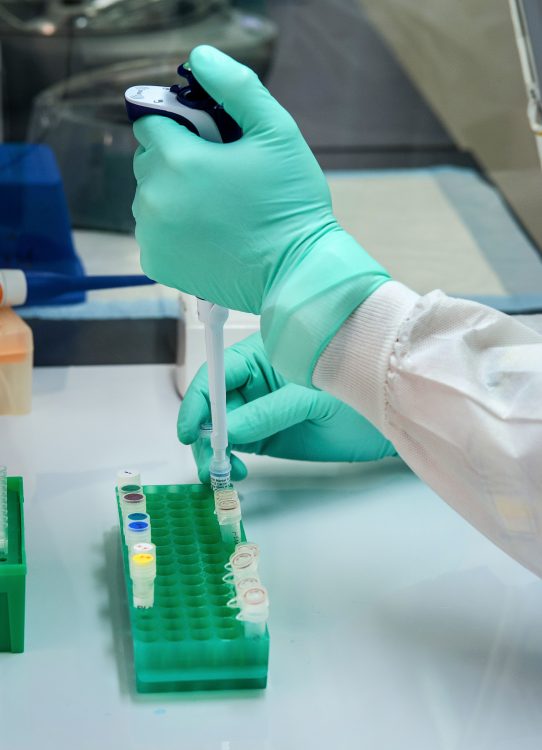
Even as dengue cases continue to rise, the government claims surveillance and destruction of potential mosquito breeding sites is still being done. The crisis has kept major laboratories and hospitals, especially those within the valley, busy for the past few months as patients pour in for tests. Meanwhile, patients complain the tests are expensive, and wonder if they are being duped even as the government looks away. South Asia Check spoke with different laboratories within the valley to find out what the hubris is all about.
While the National Laboratory of Nepal conducts dengue tests for Rs800, private laboratories charge between Rs1,200 and 2,000. With the test charges varying depending on the lab, patients accuse health care providers of taking advantage of the situation by charging exorbitant fees. Hemant Adhikari, a patient from Koteshwor, said a private health care institution in his area charged him Rs1,500 for dengue rapid test and Rs550 for complete blood count (CBC). Rajendra Ghimire, from Kathmandu, paid Rs 500 for dengue rapid test and Rs150 for CBC at Sukraraj Tropical and Infectious Disease Hospital. Alka Hospital at Jawalakhel in Lalitpur charges Rs2,000 for dengue rapid test and Rs600 for complete blood count. At Sumeru Hospital in Dhapakhel, Lalitpur, the lowest price for testing was 1,200 rupees.
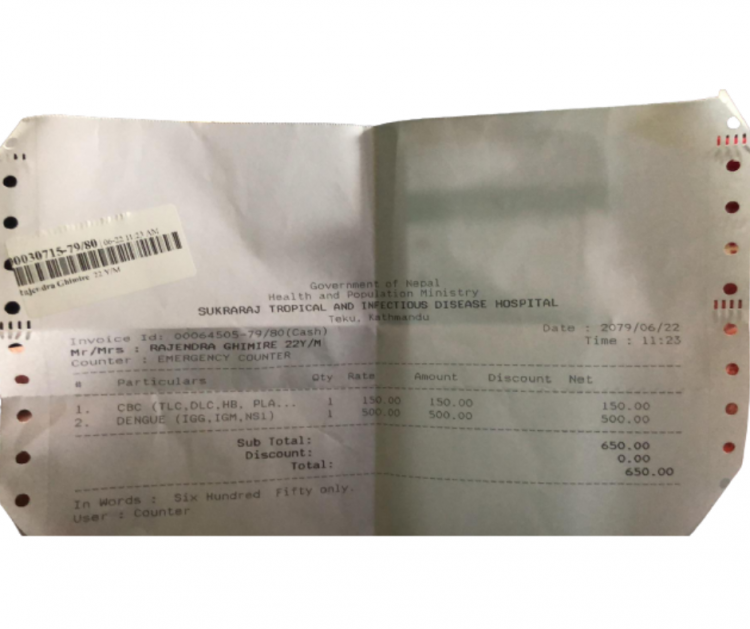
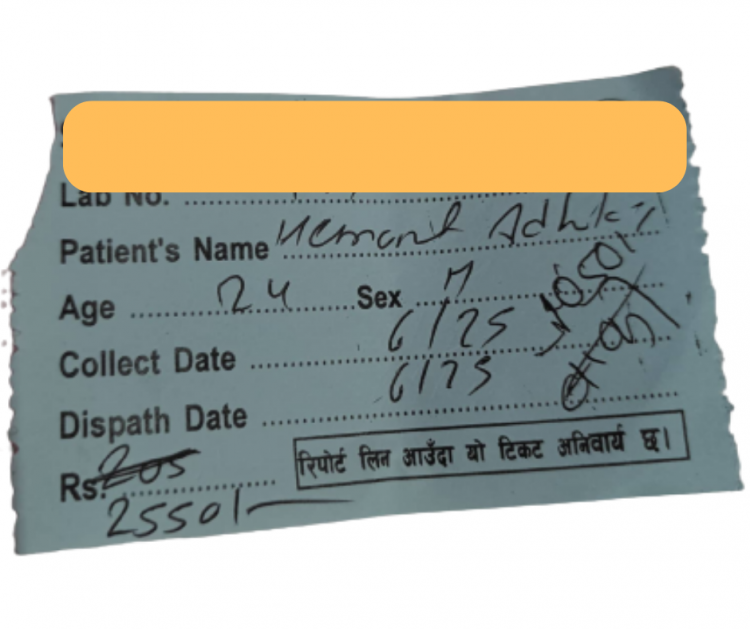
Dr. Runa Jha, Director of National Public Health Laboratory (NPHL) says the price difference could be the result of varying test kits available in the market. “We had sent a proposal to the ministry for capping charges, with the assessment of dengue test kit prices, long ago (September 8, 2022). I don’t know if any decision has been taken by the ministry on the matter,” Jha told South Asia Check.
“The average test kit price was Rs521 at that time, and we proposed to make it Rs800 in government laboratories and Rs1,500 in private ones. At the time, we had heard private institutions were charging upto Rs3,500 for lab tests,” Dr. Jha added.
Dr. Padam Bahadur Khadka, Chairperson of Association of Private Health Institutions in Nepal (APHIN), said, “APHIN requested all its member institutions to provide upto fifty percent concession on lab tests, but the implementation is on the part of member institutions.” The umbrella organisation cannot regulate member organisations to provide a certain concession, he added.
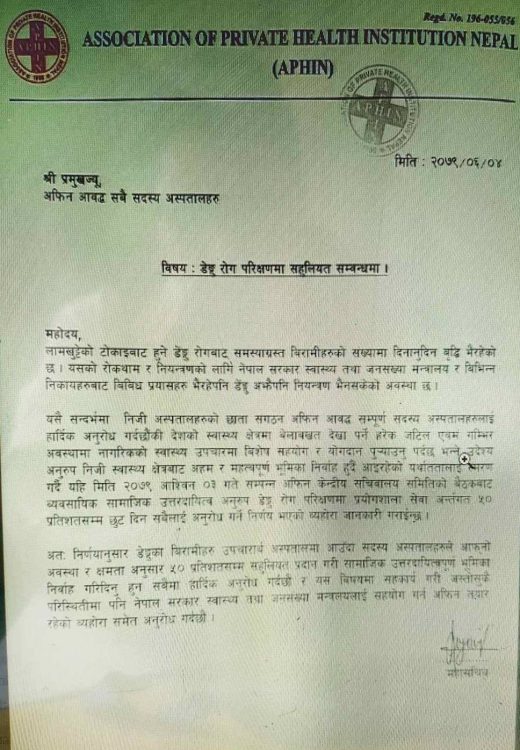
When asked about the high price difference between government and private labs, Dr. Khadka said labs are classified into different categories, and due to this they can charge in accordance with the facility they provide. “Even charges at government hospitals and labs are not capped. Why, then, would private labs charge the same, charges are determined in accordance with facilities and classification of laboratories”.
Dr. Jha agrees with Dr. Khadka. “Yes, there is a price difference between government and private labs,” Jha said, adding, “These charges can be capped by the government. We have an experience of capping health service charges during Covid-19, but with lab test prices, bed and treatment prices were also capped, but we (NPHL) can only give suggestions regarding this matter, and the ultimate decision can only be made by the ministry.”
Dr. Sanjay Kumar Thakur, Spokesperson of the Ministry of Health and Population, says the ministry had formed a committee to discuss capping the lab test charges. Dr. Jha, a member of the committee, says she has no knowledge of the formal meeting of the committee, but she had sent a proposal for capping to the ministry long before the committee was formed.
“While capping charges is a good move, putting a ceiling upon lab test charges will not help. Rather, we should focus on capping treatment and other related charges also,” Dr. Jha added.
In similar circumstances, the Delhi government in 2015 capped test prices at INR600 when it found private labs charging exorbitantly. Earlier this August, Tribune reported that dengue test prices were capped at INR600 in Patiala district of Punjab province in India. Even as Nepal faces its worst dengue crisis ever, the price variation continues to worry patients as they are unable to pay the exorbitant fees set by private labs and hospitals.
With the dengue epidemic failing to die out and the authorities failing to respond effectively, and with growing fears of the spread of zika and chikungunya as per recent media reports, citizens wonder how they are going to pay for the extra costs of testing.
This material is copyrighted but may be used for any purpose by giving due credit to southasiacheck.org.
Comments
Latest Stories
- In Public Interest Covid-19 cases are low, but that’s not an excuse to avoid vaccination
- In Public Interest What is BF.7, the sub-variant that has the world by its grip?
- In Public Interest Threat of a new Covid-19 wave looms large amid vaccine shortage in Nepal
- In Public Interest As cases decline, Covid-19 test centres in Kathmandu are desolate lot
- In Public Interest Dengue test fee disparity has patients wondering if they’re being cheated
- In Public Interest As dengue rages on, confusion galore about what it is and what its symptoms are. Here’s what you need to know
In Public Interest
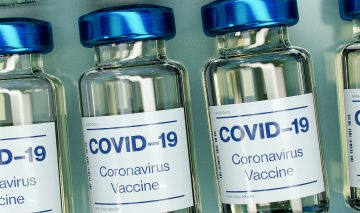 Covid-19 cases are low, but that’s not an excuse to avoid vaccination
The Pfizer-BioNTech bivalent vaccines authorised by the Nepal Government provide better protection a...
Read More
Covid-19 cases are low, but that’s not an excuse to avoid vaccination
The Pfizer-BioNTech bivalent vaccines authorised by the Nepal Government provide better protection a...
Read More
- What is BF.7, the sub-variant that has the world by its grip?
- Threat of a new Covid-19 wave looms large amid vaccine shortage in Nepal
- As cases decline, Covid-19 test centres in Kathmandu are desolate lot
- Dengue test fee disparity has patients wondering if they’re being cheated
- As dengue rages on, confusion galore about what it is and what its symptoms are. Here’s what you need to know